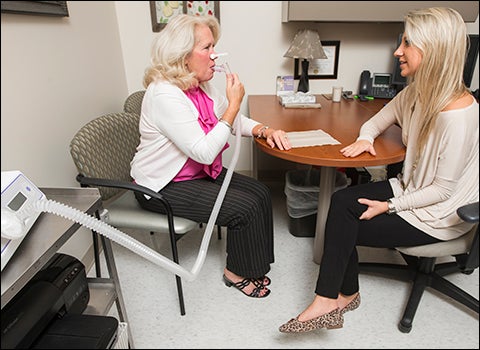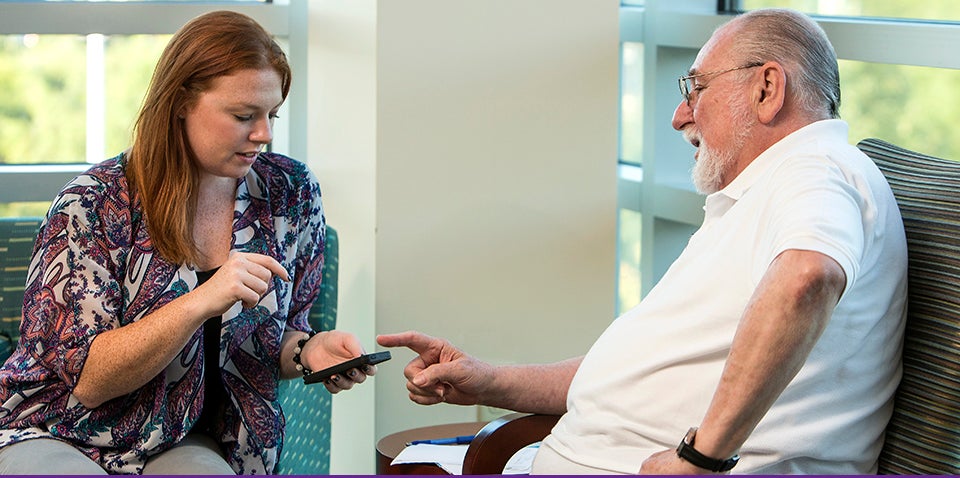HUNGRY FOR EXPERIENCE
Nutrition Science expands clinical opportunities for students
It was early on a Friday morning, but East Carolina University nutrition student Kara Massotti was wide awake and focused on her patient at ECU’s Family Medicine Center. George Broussard needed to keep better track of his calories, and the recommended tool was a smart phone application.
Massotti was patient and encouraging as her patient worked through the process of setting and resetting his password, exploring the app and asking questions about how he should enter his food and drink daily.
“It helps because it makes you conscious of (your habits),” she explained, showing him how to scan barcodes or enter the components of homemade meals, like a sandwich.
This kind of interaction is crucial for Massotti – a senior and New York native who hopes to stay in North Carolina and work as a dietitian. She previously volunteered with a project providing healthy snacks to the Boys and Girls Clubs of Pitt County () but knows “that’s not what I’m going to be doing every day in my career.”

ECU nutrition science student Perri Potter, right, performs a resting energy expenditure check for Lynn Parham. The test determines how many calories a patient needs to take in.
Now she’s keeping charts for ECU Physicians patients, sitting in on visits with clinical nutrition specialist Kay Craven, and helping lead weight management classes.
“It’s one thing to sit in the classroom and know all the facts…but understanding how to tell (a patient) that information? It’s different,” Massotti said.
The ECU Department of Nutrition Science relocated from east campus to the College of Allied Health Sciences this year, and department leadership said the move is beneficial for increasing this type of clinical experience for its students.
“Nutrition isn’t just the components of food – calories, vitamins and fats,” said Melani Duffrin, professor in the Department of Nutrition Science. “Nutrition is a huge component of human health and well-being.”
“We wanted to make sure nutrition was being represented on the health sciences campus,” she added. “All of our areas of science impact one another.”
So Duffrin and other faculty set out to form partnerships with their new neighbors. They’re collaborating with the Brody School of Medicine’s Department of Family Medicine and the Department of Pediatrics’ healthy weight group, as well as seeking service-learning and research opportunities with the College of Nursing.
It’s an advantage of proximity, Duffrin explained.
“(Faculty from other departments) come over here more often and engage with our students more often” since the move to west campus, she said. “(The students) are getting earlier exposure to career opportunities and networking.”
Although a mandatory clinical internship and capstone course for nutrition students are still a few years off, however, Duffrin said the move enables them to get into patient care settings as early as their sophomore year. And students are hungry for those experiences.
“I felt like I needed an edge, especially for applying for the (mandatory) internship after my degree,” said Perri Potter, a senior nutrition student from Charlotte.
Students who want to become registered dietitians after college must complete an additional internship at an approved site and then pass the Registered Dietitian exam.
Potter, like Massotti, is studying under Kay Craven in the Family Medicine Center. There, she has had regular patient interactions, learned to measure resting energy expenditure to establish recommended caloric intake, and seen firsthand the challenges faced by people managing diabetes.
“I’d be lost without this experience,” Potter said. “In the classroom, you don’t fully know what you’re getting into. But here, it’s like light bulbs going off constantly.”
More information about ECU’s Nutrition Science programs is available online at http://www.ecu.edu/nutr/.
